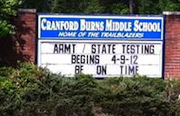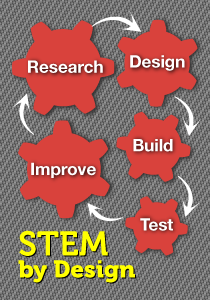Dadgum It, I’m Mad as Heck
A MiddleWeb Blog
Watch out – I have a real frustration here that may turn into a protest in this post.
I’m mad as heck. I’m watching teachers struggle to implement STEM. They love seeing the kids come alive when working on STEM projects. They want to provide these kinds of hands-on, problem-solving experiences to help them integrate and make sense of their learning. The teachers “get it.”
Instead — and here’s my frustration — they find themselves spending class time drilling on objectives that are going to be on a standardized multiple choice test. And the sheer number of tested objectives doesn’t leave time for the flexibility needed to implement STEM curriculum.
I gave multiple choice tests when I taught middle school – some were standardized and some criterion referenced. Who hasn’t used those? But I used them as part of a broader assessment package that included lab practicals, oral assessments, opened-ended tests, and observations of teamwork and the use and handling of equipment. Broad spectrum evaluation gives an accurate picture of a student and of how you’re doing as a teacher as well.

I know the arguments
I’ve heard standardized testing advocates tout the value of these tests. Among other things they tell me:
• These tests will tell you what your students know about science. Sure they will – assuming the students are good readers and can understand the questions. And assuming I didn’t go AWOL one week and teach about the wild weather taking place all around us, rather the objectives in the pacing guide. We lived in hurricane country, and when one hit the area, it provided tremendous student motivation and interest in weather.
Let’s also assume the booming thunderstorm outside while the test was being given didn’t create fear or uneasiness on the part of the students. And the hard-knock kids in the school where I taught didn’t have a crisis the night before – like Carla, who took the test after two men shot someone in her front yard. Yeah – that one-day standardized science test is really a great stand-alone judge of my students’ knowledge. NOT.

• The test assesses higher order thinking skills and asks students to apply their knowledge to solve problems. I can hear it now: Employer to employee – “Never mind about those real world problem-solving skills. What we’re really looking for is someone who can apply what they know on a higher-order thinking bubble test.”
I’m going to start cussing now
Dadgum it! (Dadgum was my grandfather’s choice of “D” word.) Students need to be able to do more than work through paper and pencil problems. In all fairness, pencil and paper can be a strong planning step in actually implementing a hands-on solution for real world problem. But it can’t stop there.
Students need the kind of inquiry-based coursework that STEM represents to prepare them for life as a successful adult, and we can’t require teachers to spend large chunks of their time preparing our students for a standardized test.
Obviously I’m not being totally objective about this issue. I have to admit that my bias against high stakes testing bubbled to the surface again this week when I read an excellent post by Seattle teacher Lindsey Durant, Conscientious Objection to Standardized Testing and Bucking Convention in My Classroom, writing about testing protests in her city. Now there’s a gutsy group of teachers I’d be proud to associate with.
Let’s measure real learning
STEM practices provide students with opportunity to develop real skills. They can boost their thinking and reasoning power by solving real problems together. Teaching STEM is complex – all of the learning won’t be captured by a multiple choice test. We need more ongoing collaboration between the education research community and the practical application community to come up with non-intrusive systems of measuring real learning.

My thoughts to the test-makers and policy makers and top education leaders: Please step back and support the professionals (the teachers) in doing their real job before test-passion obliterates the love of learning.





































Anne, I totally agree! I could not have stayed in teaching 32 year if my last ones had been in the classroom where ALL the testing was required. I hate the way it saps so much creativity out of the classroom. I feel for the teachers I work with trying to fit in a good quality teaching.
I totally agree, Dianne – I’d have to go AWOL with my teaching today with the strict adherence to step-by-step pacing were required . . . especially since I started teaching when I had freedom to work toward student mastery by allotting the time to specific objectives as needed, and I had time for more inquiry-based teaching and learning.
Very well said, Anne! I am both enraged (right along with you!) and comforted by your post. I am still trying to hang on to the belief that instruction, rich with best practices, naturally prepares students for these tests. The hope is that they are ready for the standardized test based on consistent, effective instruction, which includes an appropriate mix of meaningful formative assessments. Yet, you bring up so many great points to support the fact that our passion for teaching and making the learning process for students meaningful is in jeopardy of being sabotaged. And yet, I’m still hanging on…there is nothing else to do.
Thanks for your insights!
Thanks, Elizabeth, and by all means, keep hanging on! Do you realize how many teachers have entered the profession since high-stakes testing became the norm, and how much that has affected the thinking about what and how to teach? Scary. We have some of the most creative, energetic, and educated teachers coming into the profession today that I’ve ever seen. And lots of them are leaving because they know that “rule by testing” isn’t the way to engage, inform, and educate students. I agree with your idea of meaningful formative assessments – we can’t do without those. And who better to develop those than informed teachers?
Anne,
One of my biggest moral struggles as an educator of young children is how high-stakes tests ZAP the love of learning right out of my students. Even 5-yr.-olds become anxious when I sit them down and explain that they are going to be timed for 1 minute as they rapidly name letters and sound out make-believe words. I watch their love of learning smile transform into a frown and immediately feel like a horrible teacher. Now, don’t get me wrong, I believe assessments can provide data to guide learning! I constantly assess my kiddos using formative and summative assessments that measure authentic learning to inform my instruction. But- high-stakes tests that measure isolated skills do not provide me with rich data, and harm my students. So, can STEM and standardized assessments coexist? I am yet to be convinced.
You know I agree with you, Lindsey! Love of learning is what guantees that learning will happen. And I do agree that we are harming our students. I had an 8th grade student who was from a high-risk situation, and had a lot of capability. She had been “beaten down” in throughout her life and she was gaining confidence as teachers in our school worked with her. I remember when she got her test scores back. At this point they were still understandably low. She grew angry and said, “I knew I was stupid!” And she quit trying. One test – one life. We never got her back – it was so near the end of the year that we didn’t have time to undo the damage. The next year she was off to a big high school, still convinced that she didn’t have what it takes. Test scores don’t give big pictures, or even true pictures. They give isolated snapshots. They MUST be taken in context with solid, formative assessments to have any semblance of validity.
“Watch out – I have a real frustration here that may turn into a protest in this post.”
Dear Anne,
There is a national protest already underway that could use a voice like yours to forward the cause. Please visit http://www.unitedoptout.com.
Other organizations who share your frustration and have baked up their words with action are: http://www.fairtest.org, http://www.rethinkingschools.com, http://www.parentsacrossamerica.org.
Until educators stop being mad and start acting out, education policy will not change. The opposition has a narrative that is stronger than the national will of teachers and just strong enough to convince the naive and apathetic.
Thank you for the thoughts you share on this blog, the words you use to inspire learning, and the passion you bring to STEM education.
Lori Walton
Thanks, Lori. I’m off to check out the sites you listed! Didn’t realize there was much organized effort to combat the misuse of standardized tests, so I look forward to visiting the sites. Hopefully the readers of this post will do the same.